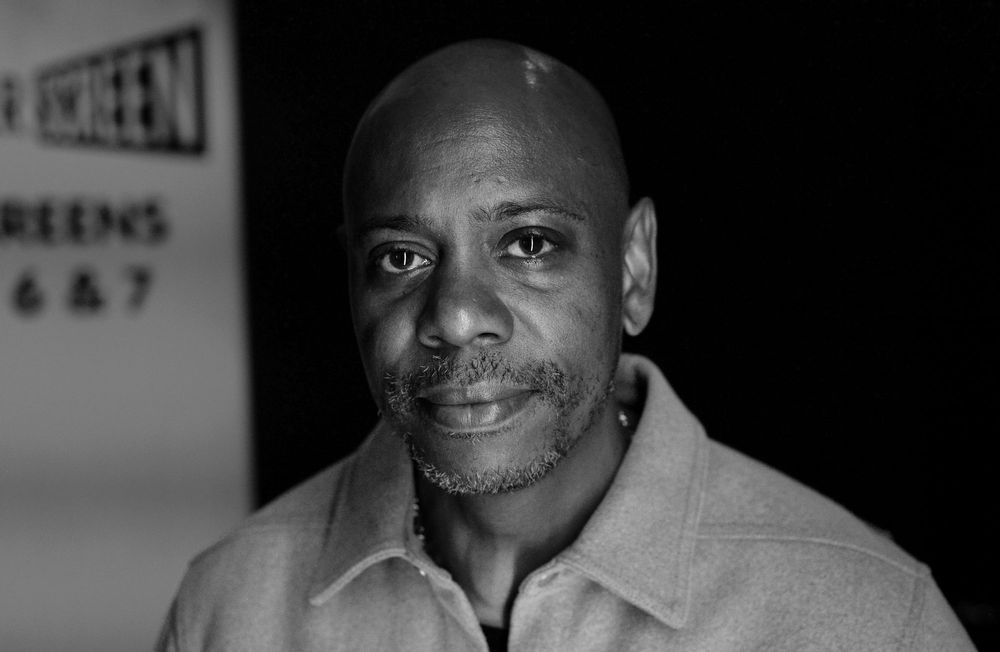For a supposed advocate of the First Amendment, Dave Chappelle sure seems to have a lot of problems with it.
Toward the end of his new Netflix special, What’s in a Name?, Chappelle recalls the moment a group of students at his alma mater chastised him for transphobic jokes he made in his two previous standup specials. In defense, he employs the same fraught, melodramatic language he’s accused his critics of using to silence comedians: “These kids didn’t understand that they were instruments in oppression.”
Therein lies the disappointing irony of Chappelle’s latest, a capturing of a June 20 speech he gave at Duke Ellington School of Arts, the Washington, D.C. institution that helped him kickstart his entertainment career. There are spurts of deft humor and humanity, but, as has been increasingly the case, his talking points are undone by his own self-absorption.
At his best, Chappelle blends surrealism with hyper-specific observations about racism, economics, and interpersonal behaviors to make poignant commentary about the world we live in. But, like his 8:46 special, this one is more grounded. In What’s in a Name?, Chappelle’s anecdotes spill out like a friend’s recollection of the good ol’ days. It’s an earthly origin story, a tale of a Chocolate City kid looking for an escape from a dangerous high school he attended during the crack epidemic. Taking advice from a comedian who told him he should learn to act in order to be a standup comic, he recalls discovering the aforementioned arts school, where teachers and students welcomed him with their open, unorthodox arms.
“The art bouncing off the walls,” he remembers of his first day in class. “My first thought [was], ‘I’m not good enough, I’m sure.’” Of course, we know how his journey played out. Chappelle graduated, lit up the comedy scene, dropped a classic stoner flick, and eventually created Chappelle’s Show, a sketch comedy series that propelled him to superstardom.
He fills in the in-between stuff with colorful memories of business-like but “palpably kind” teachers, an epic barbershop roast session, and eye-opening lessons. These stories are threaded by Chappelle’s earnestness and knack for observation, adding context to the moments that made him a man. Occasionally, he gets caught up in patting himself on the back, but he does so with nice comedic timing that breaks up the wide-eyedness so he doesn’t sound like a total sap.
What were once punchy quips have turned into crude, incongruous metaphors. What was otherwise a tender love letter to his old school turns into a half-baked, self-serving political speech.
Even if it does get self-indulgent, Chappelle has the right to celebrate the occasion. The speech he’s giving is in celebration of the theater being named in his honor. It turns out that the school administrators—and perhaps some of the students—are cool with dedicating the auditorium to Duke Ellington’s most famous alumnus, crass jokes or not. The greater crimes are found in his claims that, by telling inane jokes, he’s on a crusade for justice.
Since dropping his Sticks & Stones Netflix special three years ago, Chappelle’s transitioned from comedian to freedom fighter, arguing for comics and their right to say whatever they want whenever they want to. He’s not alone—it’s become part of a collective “cancel culture” diatribe plenty of comics have let loose the last several years. That self-righteous trend only continues in What’s in a Name?
“The more you say I can’t say something, the more urgent it is for me to say it,” he says at one point of the special. “And it has nothing to do with what you’re saying I can’t say. It has everything to do with my right—my freedom—of artistic expression that is valuable to me.”
He accuses the media of taking out the nuance of his jokes in their reporting. He makes a funny Bugs Bunny joke to demonstrate his point, but it all feels like a red herring. In the plainest terms possible, Chappelle repeatedly misgendered trans women while questioning their entire existence. While those bits don’t even come close to landing, they play out like much sloppier versions of jokes he previously designed to speak to dark realities. He was trying to make a point. He said what he said. He’s spent the last few years arguing for the right for all comics to say what they mean, but that same thought is the double-edged sword of free speech: critics can respond as they see fit, too. A lot of the time, they’ve been laughing along with him.
Chappelle recently received a Primetime Emmy nomination for his 2021 special, The Closer, which included many jokes fans and detractors alike called transphobic. Employees at Netflix even staged a walkout. Transgender rights activists continue speaking out about his jokes. For his part, Chappelle has supposedly welcomed conversation about his jokes, but based on the one he had with students at Duke Ellington—and his recap from his latest special—it doesn’t look like he’s interested in anything beyond validation.
With his mix of accolades and positive fan reception, you’re left with the same question many have had for the last couple of years: If Dave Chappelle is so committed to free speech, and he’s still enjoying so much success, why does he care so much about his critics? (They’re just opinions, right?) The critiques have brought him out of character, and as a result, he ends up looking like an old man shaking his fist at a tweet. What were once punchy quips have turned into crude, incongruous metaphors. What was otherwise a tender love letter to his old school turns into a half-baked, self-serving political speech.
For the last few years, Dave Chappelle has used grandiose framing and a misguided notion of comedian solidarity to validate his punchlines. And that’s the problem. His best jokes used to justify themselves.

Comments
Leave a comment